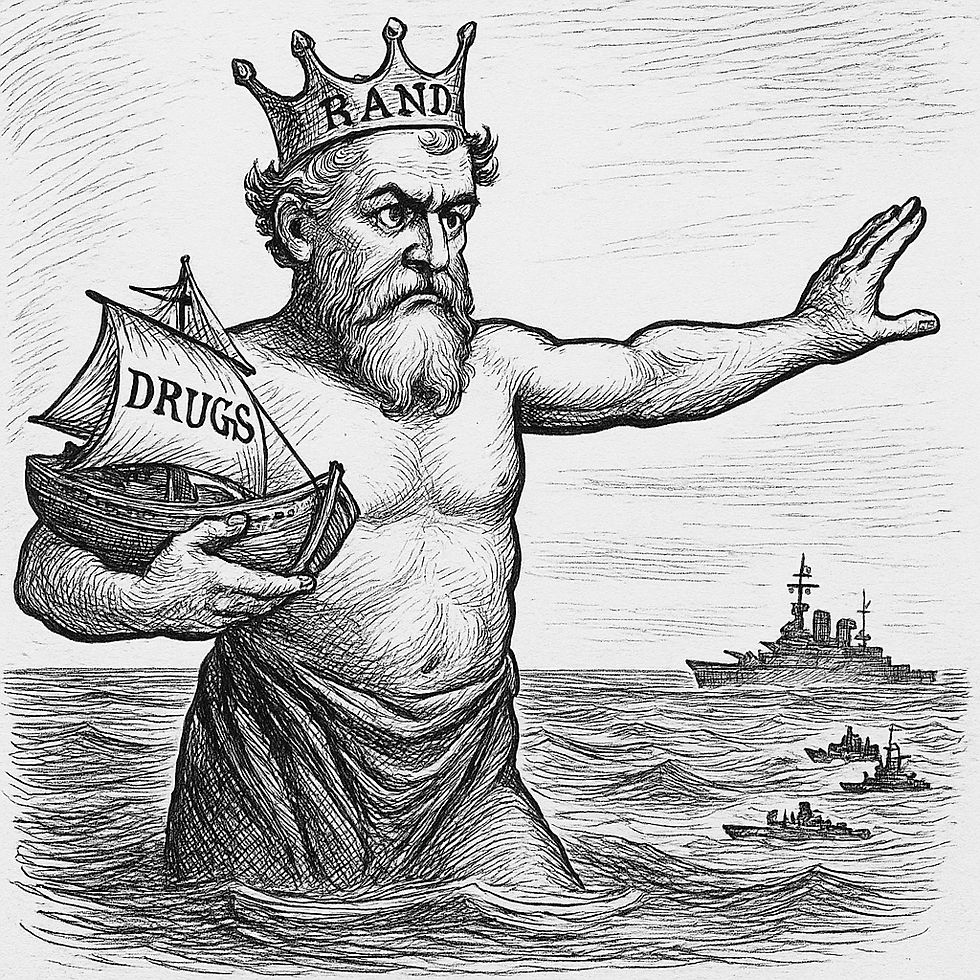RAND PAUL NEEDS TO CHECK HIS COMPASS
- lhpgop
- Sep 13, 2025
- 4 min read
FOLLOWING HIS DENUNCIATION OF THE TRUMP ADMINSITRATION FOR IT'S HANDLING OF THE RECENT DRUG SMUGGLING BOAT, LET'S CALL HIM OUT.

Introduction
The early September 2025 strike on a Venezuelan vessel suspected of drug smuggling ignited controversy in Washington. While the Trump administration framed the action as a lawful strike against a cartel-linked threat, Senator Rand Paul (R-KY) quickly denounced it as “unconstitutional,” arguing that the President lacks unilateral authority to destroy vessels merely on suspicion of drug trafficking. This statement, consistent with Paul’s libertarian streak, raises serious questions: was this a principled stand for constitutional restraint, or selective outrage misapplied at a time when U.S. citizens face escalating threats from transnational cartels?
The Context: Cartels, Terror Designations, and Maduro’s Role
The Venezuelan vessel in question was not just a random fishing boat. Intelligence assessments suggested its operators were employees or affiliates of cartel networks, possibly linked to Tren de Aragua or the Cartel de los Soles. Both groups have been formally designated by the U.S. government as Foreign Terrorist Organizations (FTOs) or Specially Designated Global Terrorists (SDGTs).
Cartel de los Soles has been described by the U.S. Treasury as a criminal-terrorist syndicate run by Venezuela’s top brass, with Nicolás Maduro himself labeled as its boss.
Tren de Aragua, Venezuela’s most feared gang, was designated as a terrorist group in February 2025 and has since been tied to narcotics smuggling, extortion, and trafficking operations stretching across South America and into the U.S.
The Trump administration’s logic is straightforward: if Maduro presides over a narco-state and these cartels are formally categorized as terrorist cells, then vessels operated by their members represent not ordinary smugglers but terrorist actors. Under this framework, destroying such a ship is not a “law enforcement” action requiring warrants but a military response against an enemy designated under counterterrorism authorities.
Rand Paul’s Objection: Consistency or Selectivity?
Paul’s constitutional argument rests on due process. He contends that the executive branch cannot unilaterally destroy vessels on mere suspicion, equating it to executing a citizen without trial. While consistent with his long-time opposition to unchecked executive war powers, the objection rings hollow in this case:
Congressional Designation – Once the U.S. formally designates cartels as FTOs, any engagement with them falls under national security rather than domestic law enforcement. This shifts the legal frame from “search warrant” to “rules of armed conflict.”
Imminence of Threat – If intelligence shows cartel vessels actively smuggling drugs or weapons toward U.S. shores, the Commander-in-Chief has a duty to repel the threat. Waiting for congressional debate could expose American lives to danger.
Precedent – Past presidents, from Reagan to Obama, have used military force against designated terrorist entities without prior declarations of war. Paul did not raise the same level of outrage in all such instances, suggesting his criticism is at least partly political.
Paul’s Record as a Military Roadblock
Paul has a well-documented record of hindering U.S. military or counterterror operations through procedural objections and “principled” speeches:
Yemen War Powers Act (2018–2019): Paul voted to end U.S. support for Saudi-led operations, a move vetoed by Trump.
Syria (2023 & 2025): Introduced resolutions to force troop withdrawals, all of which failed by wide margins in the Senate.
Niger (2023): Tried to block deployments against jihadist networks, defeated 86–11.
Iraq AUMF Repeals: Pressed for blanket repeals that went far beyond what Congress was willing to accept, and lost by lopsided votes.
These efforts portray Paul as consistent in opposing executive power, but they also underline the critique that he has become more of a symbolic gadfly than an effective policymaker. His libertarian purity rarely translates into practical outcomes.
The Missing Fury: Fauci and the CDC
Perhaps the most glaring inconsistency in Paul’s priorities is what he chooses not to pursue with equal fervor. Paul made headlines during the COVID-19 years by grilling Dr. Anthony Fauci in Senate hearings, alleging dishonesty about gain-of-function research and NIH funding. Yet, despite countless soundbites and heated exchanges, Paul has not pushed through a serious indictment referral or criminal accountability measures for Fauci or other CDC officials.
Instead of turning his senatorial fury into lasting accountability in one of the most consequential public health scandals in U.S. history, Paul appears to have redirected his spotlight to the Venezuelan boat strike — an issue where his stand is unlikely to change policy but guaranteed to generate headlines.
Conclusion: Principle, Politics, or Irrelevance?
Rand Paul’s denunciation of the Venezuelan boat strike as unconstitutional fits neatly within his libertarian brand: ever wary of executive overreach, quick to cite due process, and eager to be the lone voice of restraint. But when balanced against the facts — cartel designations, Maduro’s narco-state, and Trump’s national security rationale — Paul’s objection looks less like principled courage and more like selective indignation.
The larger irony is that Paul, after years of firebrand hearings on Fauci and the CDC, has not converted that energy into accountability for those who arguably inflicted greater systemic harm on the American public. His record suggests a senator more comfortable raising rhetorical alarms than delivering substantive victories.
In this light, Paul’s latest attack on Trump’s handling of the Venezuela strike may serve his brand, but it risks underscoring the critique that he has become irrelevant to the broader MAGA plan — a man of principle whose principles rarely reshape policy.




Comments